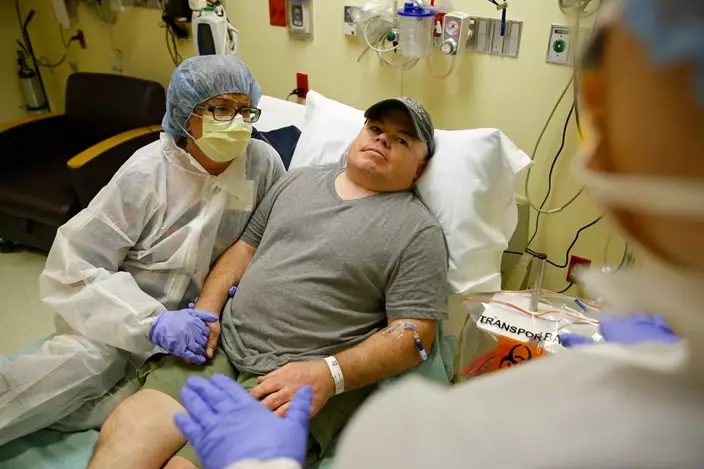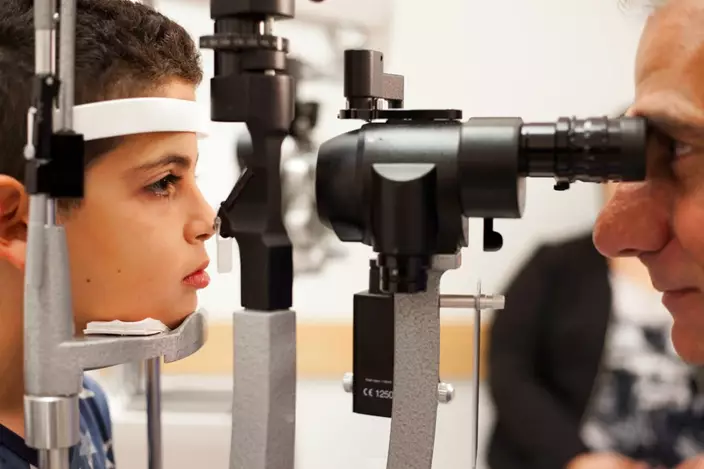After decades of hope and high promise, this was the year scientists really showed they could doctor DNA to successfully treat diseases. Gene therapies to treat cancer and even pull off the biblical-sounding feat of helping the blind to see were approved by U.S. regulators, establishing gene manipulation as a new mode of medicine.

FILE - In this Monday, Nov. 6, 2017 file photo, Brian Madeux sits with his girlfriend Marcie Humphrey while waiting to receive the first human gene editing therapy at the UCSF Benioff Children's Hospital in Oakland, Calif. Madeux, who has Hunter syndrome, received the treatment on Monday, Nov. 13. (AP Photo/Eric Risberg)
Almost 20 years ago, a teen's death in a gene experiment put a chill on what had been a field full of outsized expectations. Now, a series of jaw-dropping successes have renewed hopes that some one-time fixes of DNA, the chemical code that governs life, might turn out to be cures.
"I am totally willing to use the 'C' word," said the National Institutes of Health's director, Dr. Francis Collins.

FILE - This Saturday, Dec. 2, 2017 photo provided by Jay Konduros, left, shows him and his brother, Bill, at Jay's home in Cambridge, Ontario, Canada. The brothers, who have hemophilia, were involved in a gene therapy study for their condition. (Courtesy Jay Konduros via AP)
Gene therapy aims to treat the root cause of a problem by deleting, adding or altering DNA, rather than just treating symptoms that result from the genetic flaw.
The advent of gene editing — a more precise and long-lasting way to do gene therapy — may expand the number and types of diseases that can be treated. In November, California scientists tried editing a gene inside someone's body for the first time, using a tool called zinc finger nucleases for a man with a metabolic disease. It's like a cut-and-paste operation to place a new gene in a specific spot. Tests of another editing tool called CRISPR, to genetically alter human cells in the lab, may start next year.

FILE - In this Oct. 4, 2017, file photo, Dr. Albert Maguire, right, checks the eyes of Misa Kaabali, 8, at the Children's Hospital of Philadelphia. Misa was 4-years-old when he received his gene therapy treatment. (AP Photo/Bill West, File)
"There are a few times in our lives when science astonishes us. This is one of those times," Dr. Matthew Porteus, a Stanford University gene editing expert, told a Senate panel discussing this technology last month.
It's a common path for trail-blazing science — success initially seems within reach, setbacks send researchers back to the lab, new understandings emerge over years, and studies ultimately reveal what is safe and effective.
Here is a look at what's been achieved and what lies ahead.
A STRING OF FIRSTS
The year started with no gene therapies sold in the U.S. and only a couple elsewhere. Then the Food and Drug Administration approved the first CAR-T cell therapies, which alter a patient's own blood cells to turn them into specialized cancer killers. They're only for certain types of leukemia and lymphoma now, but more are in the works for other blood cancers.
Last week, the FDA approved Luxturna, the first gene therapy for an inherited disease, a form of blindness. People with it can't make a protein needed by the retina, tissue at the back of the eye that converts light into signals to the brain, enabling sight. The therapy injects a modified virus containing a corrective gene into the retina so the cells can make the protein.
Children who received the treatment told what it was like to gain vision.
"Oh yikes, colors. Colors are super fun," said 13-year-old Caroline Carper of Little Rock, Arkansas. "And the sunshine is blinding."
Gene therapies also showed some promise against a variety of diseases including hemophilia, a blood clotting problem; "bubble boy" disease, where a flawed immune system leaves patients vulnerable to fatal infections, and sickle cell disease, a serious and painful blood disorder common among black people.
It's not all good news, though. The therapies don't work for everyone. They're shockingly expensive. And no one knows how long some results will last, though scientists say the aim is a one-time repair that gets at the root cause.
"The whole promise ... is to cure diseases. It's based on the rationale of fixing the problem," not just improving treatment, said Dr. Carl June, a University of Pennsylvania scientist who pioneered CAR-T therapy.
A NEW FRONTIER: GENE EDITING
In mid-November, Brian Madeux, a 44-year-old Phoenix man with a metabolic disease called Hunter syndrome, had just become the first person to try an experimental gene editing treatment.
"I believe in science," he texted The Associated Press after doctors sent viruses containing a corrective gene and an editing tool through an IV into his body. The hope is that the gene and the editing tool would enter some of his liver cells and insert the instructions needed to start making an enzyme he lacks.
It's not known yet if it worked. Sangamo Therapeutics is testing its therapy in several studies, and independent monitors will help decide when results are released.
"It's a pretty exciting milestone," Collins said, because it shows a way to treat more diseases than ones that can be addressed now by altering blood cells in the lab or injecting genes into the eye.
"You can imagine having a scalable approach to thousands of genetic diseases," he said.
WHAT'S NEXT
Top of Collins' list: muscular dystrophy and sickle cell.
There's been so much progress that the NIH has modified an oversight panel that just a few years ago reviewed every gene therapy experiment in the U.S. Most are considered safe enough to go ahead without the Recombinant DNA Advisory Committee's review. The panel hasn't even met for a year.
When the panel was formed decades ago, "there was a lot of concern that a graduate student could take some of this home and create a monster in his basement," said one panel member, Boston scientist Dr. Howard Kaufman.
Those fears have eased, he said.
"There's no monsters that have materialized from this."
DES MOINES, Iowa (AP) — Stung by paying billions of dollars for settlements and trials, chemical giant Bayer has been lobbying lawmakers in three states to pass bills providing it a legal shield from lawsuits that claim its popular weedkiller Roundup causes cancer.
Nearly identical bills introduced in Iowa, Missouri and Idaho this year — with wording supplied by Bayer — would protect pesticide companies from claims they failed to warn that their product causes cancer, if their labels otherwise complied with the U.S. Environmental Protection Agency’s regulations.
But legal experts warn the legislation could have broader consequences — extending to any product liability claim or, in Iowa’s case, providing immunity from lawsuits of any kind. Critics say it could spread nationwide.
"It’s just not good government to give a company immunity for things that they’re not telling their consumers,” said Matt Clement, a Jefferson City, Missouri, attorney who represents people suing Bayer. “If they’re successful in getting this passed in Missouri, I think they’ll be trying to do this all over the country.”
Bayer described the legislation as one strategy to address the “headwinds” it faces. About 167,000 legal claims against Bayer assert Roundup causes a cancer called non-Hodgkin’s lymphoma, which Bayer disputes. The company has won some cases, settled many others but also has suffered several losses in which juries awarded huge initial judgments. It has paid about $10 billion while thousands of claims linger in court.
Though some studies associate Roundup's key ingredient with cancer, the EPA has regularly concluded it is not likely to be carcinogenic to humans when used as directed.
The costs of “defending a safe, approved product” are unsustainable, said Jess Christiansen, head of communications for Bayer's crop science division.
The legislation was introduced in targeted states pivotal to Bayer's Roundup operations and is at a different stage in each. It passed the Iowa Senate, is awaiting debate in the Missouri House and was defeated in Idaho, where this year's legislative session ended.
Farmers overwhelmingly rely on Roundup, which was introduced 50 years ago as a more efficient way to control weeds and reduce tilling and soil erosion. For crops like corn, soybeans and cotton, it’s designed to work with genetically modified seeds that resist Roundup’s deadly effect.
Missouri state Rep. Dane Diehl, a farmer who worked with Bayer to sponsor the legislation, cited concerns that costly lawsuits could force Bayer to pull Roundup from the U.S. market, leaving farmers to depend on alternative chemicals from China.
“This product, ultimately, is a tool that we need," said Diehl, a Republican.
Iowa Gov. Kim Reynolds, a Republican, said in an email the legislation maintains the integrity of the regulatory process and, without it, “Iowa risks losing hundreds of jobs” in Muscatine, an eastern Iowa city where Roundup is mostly produced.
The Associated Press is seeking public records on Bayer’s communications with governor's offices in Iowa, Missouri and Idaho.
Bayer, like other companies, hires lobbyists in states to advocate for its interests. The company backs this legislation in the states where “we have a big, direct economic impact,” Christiansen said.
Roundup’s key ingredient, glyphosate, is derived from phosphate mined in Idaho. And St. Louis is the headquarters of its North America crop science division, acquired in its 2018 purchase of Monsanto. Because of that, many of the lawsuits are filed in Missouri.
The five lobbyists registered for Bayer in Iowa and three in Idaho is largely consistent with recent years, but the number working in Missouri this year ballooned from four to nine. Lobbyist expenditures exceeded $8,000 in Idaho this year; similar information was not available in Iowa or Missouri.
Led by Bayer, a coalition of agricultural organizations called Modern Ag Alliance also is spending tens of thousands of dollars on radio and print advertisements claiming that trial lawyers and litigation threaten the availability of glyphosate.
On its website, the group asserts that at risk are 500 jobs connected to glyphosate production in Iowa, and 800 jobs in Idaho.
Bayer stopped short of threatening closures. The Iowa facilities, including in Muscatine, “are very critical facilities to our business, so we'll remain at some sort of support level,” Christiansen said.
At issue in the lawsuits and legislation is how Bayer – and any other pesticide company — communicates with consumers about the safety of its products.
Companies are required to register products with the EPA, which evaluates — and then reevaluates every 15 years — a pesticide and its label. The EPA reiterated in 2020 that glyphosate used as directed posed no health risks to humans. But a federal appeals court panel in 2022 ruled that decision “was not supported by substantial evidence” and ordered the EPA to review further.
The debate over glyphosate escalated when a 2015 report by the International Agency for Research on Cancer, part of the World Health Organization, said it's “probably carcinogenic to humans" based on “limited” evidence of cancer in people and “sufficient” evidence in study animals.
Based on that international report, California sought to add a cancer warning label to products containing glyphosate. But a federal appeals court ruled against California last November, concluding such a warning wasn't factual.
Christiansen emphasized that many regulatory agencies worldwide agree with the EPA and insisted Bayer has to stick to EPA labeling to ensure it isn't providing false or misleading information. She added that the company is transparent in the information it does provide.
Critics of the legislation aren't convinced, citing examples such as opioids and asbestos that had been deemed safe for use as directed — until they weren't.
There also are concerns that the legislation could stifle any product liability claim since most rely on the argument that a company failed to warn, said Andrew Mertens, executive director of the Iowa Association for Justice, an organization for trial lawyers.
Jonathan Cardi, a product liability and torts expert at Wake Forest University School of Law, also said a strict reading of the Iowa legislation extends beyond liability claims, and “the way it’s drafted makes it interpretable to mean nobody could bring any suit.”
In lobbying lawmakers and in speaking with the AP, Bayer representatives disputed that the legislation would cut off other legal actions. Several legal experts said the legislation is unlikely to affect the 18,000 lawsuits already pending in Missouri’s capital of Jefferson City, and wouldn’t prevent claims in states that don’t adopt similar legislation.
In Idaho, the Republican-led Senate narrowly defeated the bill amid concerns about relying on federal agencies' safety standards and limiting the ability of harmed individuals to sue.
John Gilbert, who farms in Iowa Falls, Iowa, with limited use of Roundup, called Republicans hypocritical for attempting to protect corporate interests after campaigning on standing up for Iowans.
The bill “invites a lot of reckless disregard," said Gilbert, who is on the board for the Iowa Farmers Union. “No amount of perfume’s gonna make it anything but a skunk."
Lieb reported from Jefferson City, Missouri.

FILE - Soybeans are seen in a field on a farm, Friday, Sept. 2, 2016, in Iowa. The maker of a popular weedkiller is turning to lawmakers in key states to try to squelch legal claims that it failed to warn about cancer risks. (AP Photo/Charlie Neibergall, File)

FILE - The Bayer AG corporate logo is displayed on a building of the German drug and chemicals company in Berlin, Monday, May 23, 2016. Bayer, the maker of a popular weedkiller, is turning to lawmakers in key states to try to squelch legal claims that it failed to warn about cancer risks. Bayer disputes such claims but already has paid about $10 billion to resolve them. (AP Photo/Markus Schreiber, File)

FILE - Phosphate ore is dug up and transported from Monsanto Company's South Rasmussen Mine site near Soda Springs, Idaho, July 16, 2009. Bayer acquired Monsanto in 2018. Bayer, the maker of a popular weedkiller, is turning to lawmakers in key states to try to squelch legal claims that it failed to warn about cancer risks. The company disputes such claims. A key ingredient of the weedkiller, glyphosate, is derived from phosphate mined in Idaho. (Bill Schaefer/The Idaho State Journal via AP, File)

FILE - Containers of Roundup are displayed on a store shelf in San Francisco, Feb. 24, 2019. Thousands of legal claims against drug and chemicals company Bayer assert Roundup causes a cancer called non-Hodgkin’s lymphoma, which Bayer disputes. (AP Photo/Haven Daley, File)

FILE - A soybean field is sprayed in Iowa, July 11, 2013. The maker of a popular weedkiller is turning to lawmakers in key states to try to squelch legal claims that it failed to warn about cancer risks. (AP Photo/Charlie Neibergall, File)
















